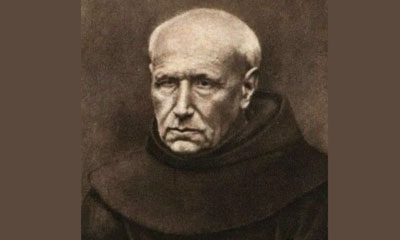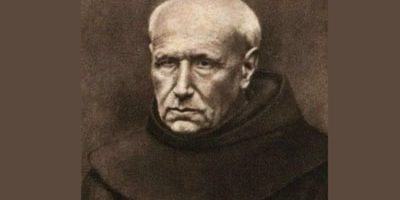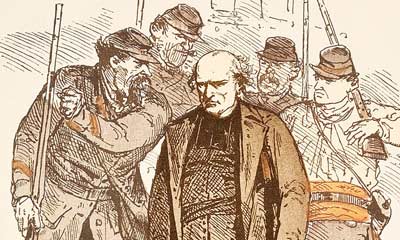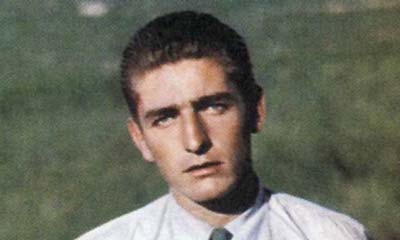December 11, 2024
Blessed Valentin Paquay
Dear Friends,
Pope John Paul II regarded the voluntary poverty of religious life as an answer to the idolatry of money that plagues our world, marred by “a materialism which craves possessions, heedless of the needs and sufferings of the weakest, and lacking any concern for the balance of natural resources. The reply of the consecrated life is found in the profession of evangelical poverty, which can be lived in different ways and is often expressed in an active involvement in the promotion of solidarity and charity” (Apostolic Exhortation Vita Consecrata, nos. 89-90). Blessed Valentinus Paquay embraced a way of consecrated life that was especially grounded in the practice of poverty.
 Jean-Louis Paquay was born in Tongeren, in Belgian Limburg, on November 17, 1828. The ancient city is crowned by the 13th-century church of Our Lady, a Marian pilgrimage shrine. The boy’s father, Henri, was a farmer of Walloon origin; his mother belonged to a local middle-class family. Following their wedding in 1821, they ran a local inn that provided them with moderately comfortable means. The couple’s first three children died very young as a result of an epidemic, then came a daughter, Marie, and Jean-Louis, who was baptized on the day of his birth. Five other children were born to the Paquay family. The main concern of these devout Christian parents was the religious and moral education of their children. Jean-Louis had an impetuous nature, which they strove to correct, but that would flare up again on occasion when he entered the religious life.
Jean-Louis Paquay was born in Tongeren, in Belgian Limburg, on November 17, 1828. The ancient city is crowned by the 13th-century church of Our Lady, a Marian pilgrimage shrine. The boy’s father, Henri, was a farmer of Walloon origin; his mother belonged to a local middle-class family. Following their wedding in 1821, they ran a local inn that provided them with moderately comfortable means. The couple’s first three children died very young as a result of an epidemic, then came a daughter, Marie, and Jean-Louis, who was baptized on the day of his birth. Five other children were born to the Paquay family. The main concern of these devout Christian parents was the religious and moral education of their children. Jean-Louis had an impetuous nature, which they strove to correct, but that would flare up again on occasion when he entered the religious life.
At the age of five, Jean-Louis was enrolled at the municipal school in Tongeren. His aptitude for learning attracted attention, but so did his piety, docility and kindness. In 1835, the Redemptorist Fathers (members of an Order founded in 1732 by St Alphonsus de Liguori) came to preach a fortnight’s parish mission in the church of Our Lady of Tongeren. Large numbers of the faithful attended, listening to the sermons, taking part in the ceremonies and confessing to the Fathers. It was the first time Jean-Louis went to confession: he waited a long time for his turn, because he let all the grownups go first. The confessor saw what was happening, called him over and listened to him. Touched by grace, the boy realized that his vocation was to exercise such a ministry. From then on, Jean-Louis was drawn to prayer. He received his First Holy Communion in 1840, at the age of twelve, after serious preparation.
In 1845, now a teenager, he joined the rhetoric class at the minor seminary in Saint-Trond. Although he studied hard, he was not a brilliant pupil, but his piety and religious spirit impressed those around him. He was appointed as an altar boy as soon as a vacancy occurred at the church of Our Lady. He served Mass fervently every morning before going to school. Gradually, his delicate conscience deteriorated, and he became scrupulous. He would later describe how he had gone so far as to go to confession every day for two months.
Scrupulosity is the groundless fear of committing a fault. In his Spiritual Exercises, St Ignatius shrewdly describes how it manifests itself: “It is common for people to speak of something as a scruple though it has proceeded from their own judgment and free will, for example, when I freely decide that something is a sin which is not a sin. Thus it may happen that after one has chanced to step upon a cross formed by straws, he decides according to his own way of thinking that he has sinned. In reality, this is an erroneous judgment and not a real scruple. After I have stepped upon such a cross, or after anything else I may have thought, said, or done, the suggestion may come to me from without that I have sinned, and on the other hand, it may seem to me that I have not sinned. Then if I continue to be anxious about the matter, doubting and not doubting that I sinned, there is a real scruple properly so called and a temptation from our enemy” (nos. 346-347).
Since a real scruple is involuntary and spontaneous, we need to treat it not by preventing it from arising, but by dismissing it with contempt, while letting the soul try to establish itself in the mean (cf. Exercises of St Ignatius, no. 350). To this end, complete and trusting obedience to the guidance of an experienced confessor is a very valuable and necessary aid, at least for a time. Scruples hide behind erroneous judgments that deceive under the appearance of good. A confessor’s help is therefore very useful in correcting these judgements and not allowing oneself to be led by them into destructive paths. The priest will also gradually teach his penitent to go without his help. Prayer and self-denial are also powerful tools for freeing oneself from scruples.
Not Doing Things by Halves
Jean-Louis’ Marian devotion was intense. One year after his First Holy Communion, at the age of thirteen, after hearing a sermon, he made a vow of perpetual chastity at the feet of Our Lady of Tongeren. He attended sermons regularly, especially during Lent when they took place every day, and was particularly moved by the evocation of the Passion of Our Lord, which aroused in him deep feelings of love for his Savior. The only blemish on his life at the minor seminary was his persistent refusal to take part in his classmates’ games; but his way of refusing was so gracious that no one took offense. He preferred to read and above all to visit the Blessed Sacrament. In 1847, the death of his father overwhelmed him with grief, making him even more earnest. At this time, Jean-Louis felt a certain fear of being called to the religious life; he would quickly gloss over the passages in spiritual books that touched on the subject. But the thought of death made him reflect: “Will I have the opportunity to go to confession at the hour of my death? I know not… What will my interior disposition be then? Where will I die? Will it be in a cloister? Will I be wearing the habit of St Francis? It is a mystery to me, but come what may, I am going to prepare myself for death from this very moment.” His superiors indeed soon perceived that he had a religious vocation. By 1849, with his mother’s blessing, he finally admitted to his seminary classmates his desire for a more austere and perfect life in the service of God: the next day, he made his entry into the Franciscan order. He was twenty-one years old. After a period of probation, he was called with seven other young men to take the habit, which marked the beginning of his novitiate. This he completed in Tielt, near Ghent, in one of the main centers of the Belgian Franciscan province. In these fervent days, he wrote: “Whoever enters the religious life for any other purpose than to become a saint is a fool in the fullest sense of the word…”, and: “We must not do things by halves… We must not be satisfied with mere good will.”
Pope John Paul II wrote: “As a way of showing forth the Church’s holiness, it is to be recognized that the consecrated life, which mirrors Christ’s own way of life, has an objective superiority. Precisely for this reason, it is an especially rich manifestation of Gospel values and a more complete expression of the Church’s purpose, which is the sanctification of humanity. The consecrated life proclaims and in a certain way anticipates the future age, when the fullness of the Kingdom of heaven, already present in its first fruits and in mystery, will be achieved, and when the children of the resurrection will take neither wife nor husband, but will be like the angels of God (cf. Mt 22:30)” (Vita consecrata, March 25, 1996, no. 32).
A Daunting Responsibility
On taking his vows on October 4, 1850, Jean-Louis became Brother Valentinus. He had previously written a letter to his mother and aunts asking for their forgiveness for any distress he had caused them; he saw his religious vows as the start of a new life, and wanted to embark on it with the utmost purity. He went on to study philosophy at Rekem, and then theology at Saint-Trond. He would leave these institutions with the memory of a young religious thirsting for spiritual progress and knowledge that would help save souls. On the eve of his ordination to the priesthood, fearful of the responsibility he was about to shoulder, he went into hiding. However, he was tracked down and agreed to become a priest. The ceremony took place in Liège on June 10, 1854. Friar Valentinus was twenty-six years old.
A few days later, he was sent to the convent in Hasselt (Belgium), where he would exercise his ministry for some fifty years. In August, he received the power of confession (i.e. the permission to administer the sacrament of Penance) as well as the license to preach, and he immediately started these ministries in which he excelled. So much so that when his superiors sent him to Thielt in 1857, the faithful of Hasselt were shocked: they pressed his superiors so hard that after ten months the Father was returned to them. He himself received these orders and counter-orders in a spirit of strong faith, viewing them as God’s will. His great devotion and profound humility soon earned him the nickname “het Heilig Paterke” (“the holy little Father”).
He was assigned a confessional in the Basilica of Our Lady, where he spent the greater part of his days. His welcoming attitude and his mercy attracted so many people that, like the Curé of Ars, this ministry became his main apostolate. In addition to his knowledge and prudence, he was blessed with supernatural insights and a certain ability to read souls, and would sometimes free them from great burdens. As a result, there was always a queue outside his confessional. Several penitents would later testify that in his presence, their conscience had been opened as never before. He was usually brief and very reserved in his admonitions, but the penitents would leave touched and converted. At other times, he himself enumerated the sins of the penitent as if he had been present, or recalled certain forgotten faults, not as an accuser but always with great discretion; the penitent was neither humiliated nor overwhelmed, because he felt understood and forgiven.
The Servant of Forgiveness
The Catechism of the Catholic Church teaches: “When he celebrates the sacrament of Penance, the priest is fulfilling the ministry of the Good Shepherd who seeks the lost sheep, of the Good Samaritan who binds up wounds, of the Father who awaits the prodigal son and welcomes him on his return, and of the just and impartial judge whose judgment is both just and merciful. The priest is the sign and the instrument of God’s merciful love for the sinner. The confessor is not the master of God’s forgiveness, but its servant. The minister of this sacrament should unite himself to the intention and charity of Christ. He should have a proven knowledge of Christian behavior, experience of human affairs, respect and sensitivity toward the one who has fallen; he must love the truth, be faithful to the Magisterium of the Church, and lead the penitent with patience toward healing and full maturity. He must pray and do penance for his penitent, entrusting him to the Lord’s mercy” (CCC, nos. 1465-1466).
For his part, the penitent must prepare himself to receive grace, which can never act without man’s free cooperation. The first disposition is contrition, which is sorrow of the soul and detestation for the sin committed, together with the resolution not to sin again. Secondly, confession to a priest is an essential part of the sacrament of Penance: all mortal sins of which penitents after a diligent self-examination are conscious must be recounted by them in confession, even if they are most secret. Without being strictly necessary, confession of everyday faults (venial sins) is nevertheless strongly recommended by the Church. Regular confession of our venial sins helps us form our conscience, fight against evil tendencies, let ourselves be healed by Christ and progress in the life of the Spirit. Absolution takes away sin, but it does not remedy all the disorders sin has caused (cf. CCC, nos. 1451, 1456 and 1459). To repair the damage caused by sin, the penitent must still carry out certain acts which the confessor imposes upon the penitent; this is satisfaction, also called penance, which constitutes the third act of the penitent (cf. Compendium of the Catechism, no. 303). The Catechism adds:
“The whole power of the sacrament of Penance consists in restoring us to God’s grace and joining us with him in an intimate friendship. Reconciliation with God is thus the purpose and effect of this sacrament… This sacrament also reconciles us with the Church. Sin damages or even breaks fraternal communion. The sacrament of Penance repairs or restores it” (CCC, nos. 1468-1469).
Father Valentinus’ zeal for the confessional was not a matter of personal taste. As in everything else, he drew his motivation from supernatural faith and obedience. His particular concern was for those sinners who were most deeply entrenched in evil or ignorance. After confessing for several hours, he sometimes fell on his knees to pray; the Brother Sacristan, coming to close the church, would find him exhausted, sleeping on the altar steps… He also fulfilled the ministry of ordinary or extraordinary confessor for several religious communities. Souls in search of their vocation sometimes placed themselves under his guidance, which was characterized by a high degree of discretion. A number of persons owed it to him to have found the light, and thus to have become priests, religious or nuns. He also preached missions and retreats. Those who listened to him felt that he was passing on to them the fruits of his prayer. His ministry extended to the sick and dying. When, at night, people knocked at the convent looking for a confessor for a dying person, it was almost always he who was asked for by name. He would usually stay with the patient for a long time, be it night or day. One day, Father Valentinus was told of a sick person who had absolutely refused to see a priest; he went to the patient’s home all the same. He asked to be announced, and for permission to see him. When he left, the patient, whom he had confessed, was filled with joy. In 1864, a smallpox epidemic broke out in Hasselt. A victim of his dedication, the Father also contracted the disease and was confined to his bed for five weeks. A brother who had tended to him with great care soon fell ill himself. Father Valentinus was barely convalescent but obtained permission to look after the brother himself.
Praying Always
In his sermons, he was an apostle of the devotion to the Sacred Heart of Jesus and the Eucharist. He encouraged all those who could to receive Communion frequently, anticipating the decrees of St Pius X. He practiced in an unusual way the Lord’s injunction that we must pray always (Lk 18:1). He always kept his rosary or breviary in his hand, and recited one or the other at the first opportunity. Whenever he left the convent, he would begin to pray the rosary as soon as he passed through the door. This was not always to the liking of those who accompanied him and who, at times, would have preferred to take advantage of the occasion to have a conversation with him. Father Valentinus wanted to leave Hasselt to escape the veneration bestowed on him. When he had to stay in another convent, he always tried to occupy the last place with the lay brothers. He was appointed vice-guardian of his convent on several occasions, and even guardian (i.e. superior), and in these positions displayed great kindness and profound humility. In 1890, he was elected Provincial Definitor. When people mentioned his holiness, he most often managed to turn the compliment into a joke. Yet he received extraordinary graces that he tried to conceal—but some of his ecstasies had witnesses. These extraordinary graces never distracted him from practicing obedience. Whatever he was doing, at the first ring of the bell he would stop, recognizing the call as the voice of God. When he preached a retreat to a community of Sisters, he obeyed the superior in the same way as he obeyed his own superior. His obedience to doctors’ prescriptions was so perfect that they themselves were astonished by it.
Having joined the Order of St Francis, where poverty is especially cherished, Father Valentinus owned absolutely nothing. His cell only contained the few books he needed. He wore his clothes until they were completely worn out, and when decency obliged him to replace them, he would ask to be given old clothes returned to the laundry by some confrere. On the other hand, when he was called upon to act as a begging brother, he gladly accepted this thankless task. If he had to go to a neighboring village, seven kilometers away, to hear confessions, he would make the journey on foot. When he went to preach retreats or missions, he would set off without a suitcase, taking only his breviary with him.
True Wealth
“Even before being a service on behalf of the poor, evangelical poverty is a value in itself, since it recalls the first of the Beatitudes in the imitation of the poor Christ. Its primary meaning, in fact, is to attest that God is the true wealth of the human heart. Precisely for this reason evangelical poverty forcefully challenges the idolatry of money, making a prophetic appeal as it were to society, which in so many parts of the developed world risks losing the sense of proportion and the very meaning of things” (John Paul II, Vita consecrata, no. 90). In a speech on the economic life, Pope Francis said: “Money is important, especially when there is none, and food, school, and the children’s future depend on it. But it becomes an idol when it becomes the aim. Greed, which by no coincidence is a capital sin, is the sin of idolatry because the accumulation of money per se becomes the aim of one’s own actions… When capitalism makes the seeking of profit its only purpose, it runs the risk of becoming an idolatrous framework” (February 4, 2017).
After forty years of pastoral service at the Basilica of Our Lady Virga Jesse, and ten years at the Church of St Roch, both in Hasselt, the Father foresaw that his death was near. He even told one of his penitents that he had only eight months to live. He was suffering from chronic bronchitis. The winter of 1904-1905 was particularly severe, but the Father tried to hide his sufferings. On December 11, he was still in the confessional, but his penitents could well see that he was exhausted. The next day, his state of health was so poor that he was unable to get out of bed. To a visitor who expressed compassion, he replied: “It is nothing; must I not suffer something because I have deserved it? It’s true that my legs hurt… but God wants it so.” On December 15, he received the last sacraments. He made a considerable effort to receive Holy Communion on his knees, and then asked the community to forgive him for any scandal he might have caused. Early on the morning of January 1, 1905, he attended Mass in the infirmary. At midday, he was still answering the prayers of the Angelus; he ceased to breathe at 3 pm, at the age of seventy-six. His grave attracts large numbers of pilgrims. He was beatified by St John Paul II in 2003. He is remembered liturgically on the 1st of January.
Father Valentinus Paquay, said Pope St John Paul II, “is truly a disciple of Christ and a priest according to the heart of God. As an apostle of mercy, he spent long hours in the confessional, with a special gift to place sinners anew on the right path, reminding men and women of the greatness of divine forgiveness. Placing the celebration of the Eucharistic mystery at the center of his priestly life, he invited the faithful to come frequently to communion with the Bread of Life” (Homily at the beatification, November 9, 2003). By our regular recourse to the sacraments of Penance and the Eucharist, we will draw joyfully from the fountains of salvation (Is 12:3) that flow from the Heart of Jesus.








